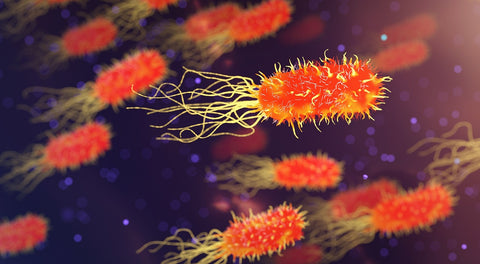Dive into the intricate world of the gut microbiome, a vast ecosystem of microorganisms essential for our overall health. From its symbiotic relationships and influential factors to its broad health implications, this article explores the critical role the gut plays in digestion, immunity, mood regulation, and more. Emphasizing the importance of nurturing this internal ecosystem through dietary and lifestyle choices, we underline the profound impact of the microbiome on holistic well-being. Join us on this enlightening journey to discover and appreciate the wonders of our body's internal universe.
Introduction
In the vast expanse of the human body, a teeming metropolis of microorganisms thrives, forming a dynamic and intricate ecosystem known as the microbiome. This vast community, predominantly located within our intestines, is so expansive that microbial cells arguably outnumber our human cells. Yet, these aren't unwanted guests. They're symbiotic partners, intricately intertwined with our health, physiology, and even our emotions.
The gut, often referred to as the body's 'second brain,' is not only central to digesting food but is also a hub of bi-directional communication with the brain, immune system, and other bodily systems. A major player in this communication is the gut microbiome, underscoring its importance far beyond digestion.
However, despite its significance, the microbiome remains an enigma to many. In this article, we'll journey into this microscopic world, exploring the vast territories of the gut, understanding its inhabitants, and deciphering their role in our well-being. Through this exploration, we aim to appreciate the profound influence of this internal universe and recognise the steps to harmonise its delicate balance.
Understanding the Gut Microbiome:
Often likened to an immense rainforest within our bodies, the gut microbiome is a bustling, ever-changing ecosystem populated with diverse microbial species, each with its unique role and function.
-
Symbiotic Relationship: Unlike pathogens that cause diseases, a vast majority of the gut microbiota maintain a symbiotic, mutually beneficial relationship with us. In this partnership, we provide these microbes a nourishing habitat, rich in nutrients. In exchange, they assist in various essential tasks. For instance, certain bacteria break down fibers from our diet into short-chain fatty acids, which nourish our gut lining and provide energy.
-
Diversity is Essential: Just as a rainforest thrives with the coexistence of various flora and fauna, our gut's health hinges on the diversity of its microbial inhabitants. A diverse microbiome implies a broader range of functional capacities, from digesting different food types to producing various beneficial compounds. This diversity also bestows resilience upon our gut, allowing it to withstand disturbances such as infections or antibiotic treatments.
-
Shifts and Changes: Our gut microbiome isn't a static entity. It undergoes shifts throughout our lifespan, starting from birth. For example, a baby's gut is first colonized during birth and continues to evolve based on feeding patterns—breast milk versus formula feeding. As we grow, diversifying our diets, traveling, and encountering different environments, our microbiome adapts accordingly, reflecting our life's journey.
-
Guardians of the Gut: Beyond digestion, our microbiome serves as a protective barrier. By occupying the gut's real estate, beneficial microbes prevent harmful pathogens from establishing a foothold. They also produce substances that inhibit the growth of harmful bacteria, ensuring our gut remains a hospitable environment for friendly microbes and an inhospitable one for potential pathogens.
By comprehending the dynamic nature of our gut microbiome and its intricate interactions with our body, we can begin to grasp its central role in health and disease.
Factors Influencing the Microbiome:
The composition and health of our gut microbiome aren't fixed entities but are rather shaped and reshaped by a myriad of factors throughout our lives. Much like a garden, the type of care, exposure, and changes it experiences influence the flora that thrives within.
-
Dietary Choices: Arguably one of the most significant influencers, the food we consume has a direct and immediate impact on our gut residents. Foods rich in fibers, like whole grains, vegetables, and fruits, serve as nourishment for beneficial bacteria, allowing them to flourish. In contrast, a diet high in sugars, artificial additives, and processed foods can give an edge to less beneficial, sometimes harmful, bacterial strains. Moreover, certain foods, such as fermented foods like yogurt, kimchi, and sauerkraut, can introduce beneficial bacteria directly into our digestive system.
-
Antibiotics and Medications: These potent tools, while essential for treating infections, can often act like a forest fire to our internal rainforest, wiping out both harmful and beneficial bacteria. Prolonged or frequent antibiotic use without necessity can lead to a diminished and less diverse microbiome, making space for opportunistic pathogens or antibiotic-resistant strains. Always ensuring they are taken as prescribed, and only when necessary, is crucial.
-
Environment and Lifestyle: Our surroundings and daily routines play pivotal roles in shaping our gut community. Factors like cleanliness, exposure to diverse environments (like farms or natural settings), and even the company of pets can influence our microbial composition. Chronic stress, for instance, has been shown to upset the balance of the gut microbiome, potentially leading to a decrease in beneficial bacteria. On the flip side, regular physical activity seems to promote a diverse and healthy microbiome.
-
Life's Milestones: Events like childbirth, illnesses, or even traveling to a new region can introduce shifts in our microbial makeup. For instance, babies born via C-section have a different initial microbiome compared to those born through vaginal delivery, reflecting the different microbial environments they're first exposed to.
-
Age: As we age, our microbiome evolves. While young adults might have a more diverse microbiome, elderly individuals might see a decline in some beneficial bacterial strains. This shift underscores the importance of dietary and lifestyle interventions to support a healthy gut throughout our lives.
Understanding the myriad factors that influence our gut microbiome helps in appreciating its dynamic nature and underscores the importance of holistic health practices to maintain its balance.
Implications for Health:
The intimate connection between the gut microbiome and our health isn't just a recent realization but has been emphasized in ancient medical traditions for centuries. Modern science, with its tools and technologies, is now validating and expanding upon these age-old wisdoms.
-
Digestive Health: At its core, our gut is a digestive organ, and the microbiome plays a fundamental role in this process. Certain strains of bacteria assist in breaking down complex carbohydrates, turning them into digestible compounds and gases. An imbalanced microbiome, on the other hand, can lead to a range of digestive issues such as bloating, irritable bowel syndrome (IBS), constipation, or diarrhea.
-
Immune System Regulation: The gut serves as a training ground for our immune cells. Here, they learn to distinguish between friendly microbes and potential threats. A healthy microbiome ensures this training is efficient, resulting in an immune system that's vigilant against pathogens yet tolerant towards harmless entities like food particles or our body's cells.
-
Mood and Neurological Health: The gut-brain axis has emerged as a significant area of research in recent years. The gut communicates with the brain via the vagus nerve, immune system, and certain microbial by-products. Imbalances in the gut microbiome have been linked to mental health issues such as anxiety, depression, and even conditions like autism. Moreover, some strains of gut bacteria produce neurotransmitters – chemicals that brain cells use to communicate.
-
Metabolic Health: The gut microbiome plays a role in how we metabolize food and even how we store fat. Some studies suggest that an imbalanced microbiome can contribute to metabolic disorders like obesity and type 2 diabetes.
-
Protection Against Pathogens: A thriving community of beneficial bacteria acts as a shield, preventing harmful pathogens from taking root in our gut. They do this by occupying available niches and producing chemicals that deter harmful bacteria.
-
Synthesis of Essential Compounds: Some vitamins, like vitamin K and certain B vitamins, are synthesized by our gut bacteria. Without a healthy microbiome, our capacity to produce these essential compounds could be compromised.
Given this multifaceted influence on health, it becomes evident that nurturing our gut microbiome isn't just about preventing stomach upsets but holds the key to comprehensive well-being. The adage, "You are what you eat," could be expanded to, "You are what your gut microbes do with what you eat."
Nurturing a Healthy Microbiome:
For those seeking to harness the benefits of a balanced gut microbiome, there are several proactive steps and strategies to adopt. Think of these as cultivating practices for your internal garden, ensuring it blossoms and flourishes.
-
Dietary Diversification: Embrace a varied diet rich in whole foods. Consuming a range of vegetables, fruits, legumes, whole grains, and lean proteins ensures that you're feeding a broad spectrum of beneficial microbes. Indian staples such as lentils (dal), chickpeas (chana), millets, and seasonal fruits and vegetables are fantastic additions.
-
Fiber Focus: Dietary fiber, found abundantly in plant-based foods, serves as fuel for many beneficial bacteria. Aim for foods high in soluble fibers like oats, flaxseeds, and fruits, as well as foods with insoluble fibers like whole grains and green leafy vegetables.
-
Probiotics and Prebiotics: While probiotics are beneficial bacteria that can be consumed through fermented foods or supplements, prebiotics are their food source. Foods like garlic, onions, bananas, and asparagus are rich in prebiotics. On the probiotics front, consider including Indian fermented foods like dahi (yogurt), idli, dosa, and pickles in your diet.
-
Limit Processed Foods and Sugars: Excessive sugar can feed harmful bacteria, disrupting the balance in your gut. Processed foods, with their additives and preservatives, can also negatively impact the microbiome.
-
Mindful Medication: While antibiotics are crucial lifesavers, use them judiciously. Ensure you follow the prescribed dosage and duration, and never self-prescribe.
-
Stay Hydrated: Water is essential for the health of the gut lining and facilitates the movement of food and waste, creating an environment where beneficial bacteria can thrive.
-
Lifestyle Choices: Managing stress, whether through meditation, yoga, or other relaxation techniques, can have a positive impact on your microbiome. Physical activity, even if it's a daily walk, can also foster a healthier gut environment.
-
Avoid Over-Sanitization: While hygiene is crucial, an over-sanitized environment can deprive us of exposure to beneficial microbes. It's okay to get a little dirty now and then, especially if you're out in nature!
By embracing these practices, you're not just nurturing your gut microbes but setting the stage for holistic health. Remember, fostering a balanced microbiome is a journey, not a destination. It requires consistent effort, awareness, and sometimes, a bit of indulgence in the diverse culinary treasures our diets offer.
Conclusion:
The intricate web of microorganisms that inhabit our gut, collectively known as the microbiome, holds unparalleled significance in the tapestry of human health. This dynamic, bustling community impacts every facet of our well-being, from digestion to mood regulation. While it's easy to relegate the significance of something so small and unseen, understanding and nurturing our gut microbiome becomes paramount when we recognize its profound influence.
Embracing a holistic approach—encompassing diet, lifestyle, and mental well-being—paves the way for a balanced microbiome. In doing so, we not only fortify our defenses against diseases but also promote comprehensive health, ensuring that our internal universe flourishes in harmony with our external world.
Listen to your gut! Pay attention to how different foods and lifestyle choices affect your digestion and overall health. Seek to nurture your internal ecosystem, ensuring it thrives and, in turn, supports your optimal well-being.




Comments (0)
There are no comments for this article. Be the first one to leave a message!